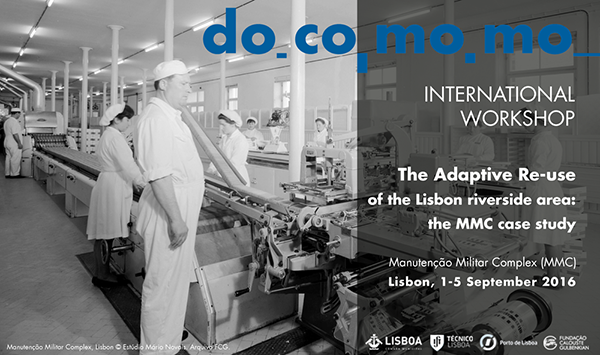Llamado a Workshop Internacional de DOCOMOMO en Lisboa
Última semana para las candidaturas estudiantiles.
El Taller Internacional DOCOMOMO, “La reutilización adaptada de la zona ribereña de Lisboa: el estudio de caso de MMC” se llevará a cabo en la Universidad de Lisboa, entre el 1 y 5 de septiembre de 2016 en el marco de la 14ª DOCOMOMO Internacional, bajo el tema “Reutilización adaptada: el movimiento moderno hacia el futuro.
Description
Every two years, since 2006, docomomo International organises an international workshop, in the framework of the International docomomo Conference, dedicated to students, researchers and professionals worldwide. The aim is to study the possibilities of managing change and future challenges in architecture, landscapes and urban areas through learning taken from the Modern Movement as a basis for the future. The next edition will be held at Instituto Superior Técnico – Lisbon University, from the 1st to the 5th September, 2016. The case study will be the Manutenção Militar Complex [Military Maintenance] (MMC).
The MMC was an industrial facility that produced food, uniforms and other goods for the Portuguese Army. The first bakery was accommodated in a former Convent – Convento das Grilas – by the end of the 19th Century. During the 20th Century, due to the needs during the First World War and, in particular, during the Ultramar War (Portuguese Colonial War) in the 1960s, the complex was expanded.
Whilst the Portuguese Army reached 200,000 men in the 1960s, it is now reduced to 20,000 active soldiers. This has led to a reduction of the investment in the factories to the point that they were found to be obsolete and that it would be more advantageous to outsource the supply of military food. Gradually the factories closed and Manutenção Militar was finally substituted by a public enterprise MM-Gestão Partilhada in 2015.
The termination of the industrial production raised the problem of finding new sustainable uses for this area on the Tagus riverfront, between the Pombaline City Harbour – Terreiro do Paço – and the Contemporary Parque das Nações. This is a challenging task: any future solution needs to have a dialogue with this current industrial heritage, which is deeply connected with recent Portuguese history, as well as with the Lisbon riverside area and the contemporary city.




